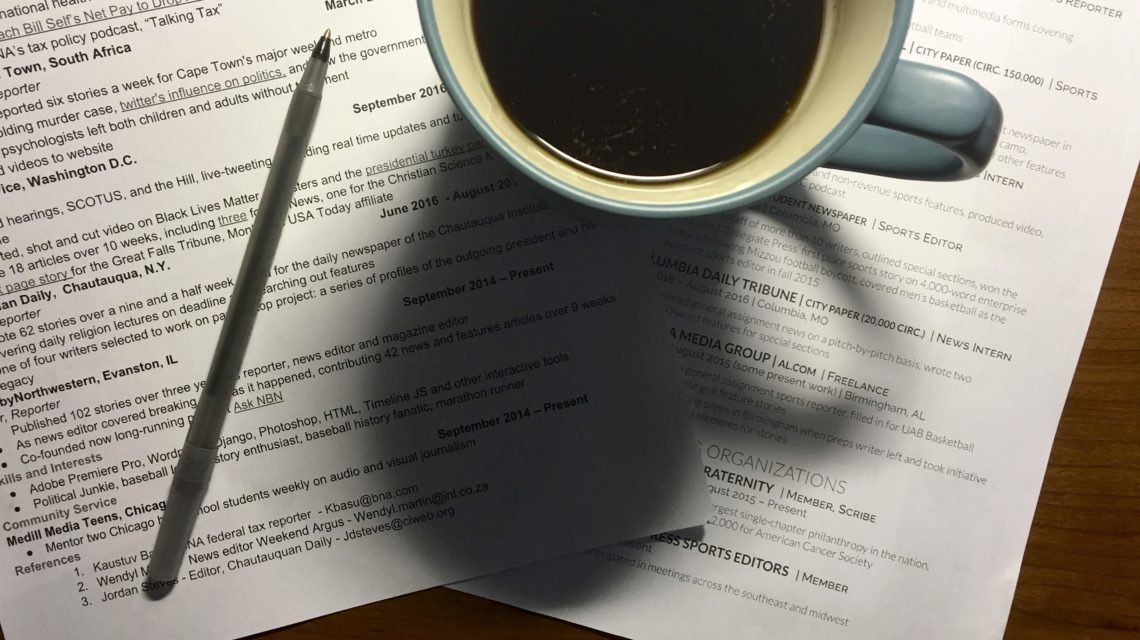By Roy LeBlanc, Assistant Metro Editor
Tampa Bay Times, December 5, 2017 —
Here’s the big secret among recruiters of journalists: We’re just looking for a reason to kick you out of the contender pile.

Resumes should be clean, readable and typo-free
Major news organizations are inundated with resumes and cover letters and more clips than we could read in seven lifetimes. So thinning the herd becomes the first order of business. As the chief newsroom recruiter for the Tampa Bay Times, I’ve tossed many a packet from the pile because of a simple mistake. Small things matter in big ways. Accuracy is currency. If an applicant can’t deliver accuracy in the packet that is supposed to impress a hiring manager, why should that manager trust anything in it?
The whole packet is basically a sales pitch and the product is yourself. And if anything in the packet seems like you’re mailing it in, you’ve just made it easy for the recruiter to dismiss you.
So whether you’re trying for an internship or a job, here are 10 tips to help you, at the very least, make it from the big pile of pretenders to the small pile of contenders.
1. Follow directions. Seems obvious, right? So why is it so hard for some people? If there’s a deadline, make deadline. If the posting says include four clips, that doesn’t mean three, or five, or seven. If the recruiter asks for a format that will print cleanly, print one from the link you’re sending and make sure it comes out pristine and readable.
2. No typos in resumes and cover letters. Another no brainer. And yet….. For instance, the letter writer who left the “l’’ out of public. Yes, it really happened.
3. Tailor your cover letter to the organization you’re applying to. We want people who want to work here, and specifically here, and tell us why. We aren’t particularly interested in people who just want a job.
4. Tailoring that letter goes beyond just writing a generic letter and filling in blanks with the organization’s name. Remember, we see hundreds of cover letters. We can spot a generic letter with our name filled in. Do a little homework and tell us why you want to work here. Bonus points: You’re a journalist, right? So instead of “To whom it may concern’’ or “internship committee,’’ do some reporting, figure out who the decisionmaker is and address your letter accordingly. Oh, and please spell the name right.
5. If for some reason (lazy) you decide to violate tip No. 4 and use a generic letter, be darn sure you put the right name in the right blanks in the right letter. On way too many occasions the Times has gotten a cover letter that talks about how great it would be to work at the Palm Beach Post, or Boston Globe, or Dallas Morning News. All fine institutions, but we’re not looking for candidates for them. Even more hilarious is when an applicant gets it right at the top of the letter and wrong at the bottom. Ultimately, the lesson is, if you tell us you’d love to work somewhere other than the Tampa Bay Times, we’re going to wish you well and move on.
6. Speaking of generic, you don’t need a lot of bells and whistles on a resume. Fancy fonts and the like are mostly annoying. There’s nothing inherently wrong with using a time-tested template for your resume. But for god’s sake, make sure you replace the placeholders. Please don’t make me look at another resume that says “Insert career goal here.’’
7. And do you really need that career goal at the top of the resume anyway? Shouldn’t your entire packet — the resume, the clips and particularly the cover letter — just scream about the passion you feel for journalism? (Hint: The answer is yes.)
8. Cover letters and resumes are two different things, serving two different purposes. Do not turn your cover letter into a recitation of your resume. Redundancy is not a good trait for a journalist.
9. Okay, that’s what a cover letter should not be. What should it be? Tell your story, not your work history. Show some writing chops. Entertain, educate, illuminate, amuse if you dare. Which leads me directly to No. 10….
10. Don’t bore me. ‘Nuff said.












